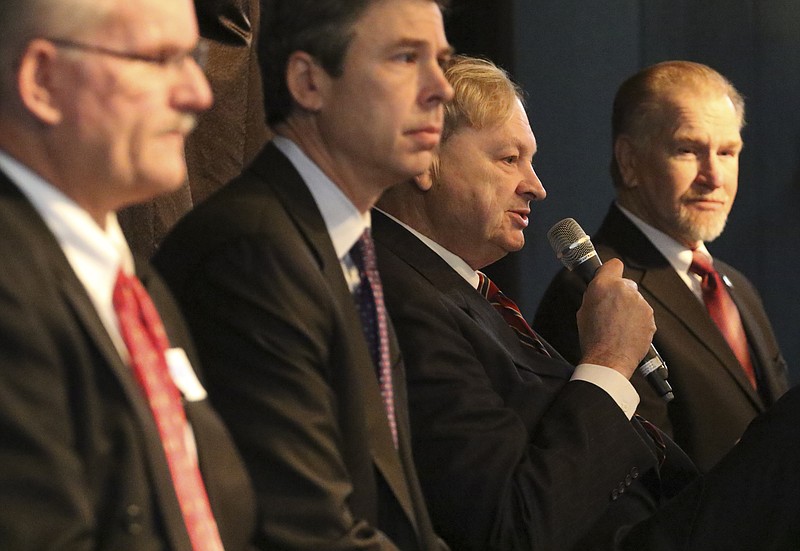
Mayoral hopeful and three-time former city councilman David Crockett would like to see a Chattanooga free and clear of Hamilton County, relieving city residents of their county taxes.
While crime, good jobs and affordable housing have topped forum discussions in Chattanooga's four-way mayoral contest, Crockett has recently taken to news conferences and talk radio to push for something the mayor ultimately does not have the authority to change. That power rests with state legislators and voters statewide.
That hasn't stopped him from calling for letting Chattanooga and other large Tennessee cities decide whether they want to separate from their counties, flying in the face of proposed de-annexation legislation recently revived by Sen. Bo Watson, R-Hixson, and Rep. Mike Carter, R-Ooltewah. It hasn't stopped him from taking swipes at Mayor Andy Berke on the issue either.
"We could spend multiples of the money we now spend on roads, affordable home ownership and community redevelopment in under-served areas of the city of Chattanooga," Crockett has said. "We would have more than enough money to tackle those problems at scale."
Allowing large cities to become independent of their counties has proved successful in Virginia, he said, describing such freedom as "the most important thing" to Chattanooga's long-term survival.
Watson flat-out doesn't see such a proposal gaining any kind of support in the Tennessee Assembly.
"I don't see this happening," Watson said in a recent phone interview, citing all the hurdles it takes to amend the state constitution.
Tennessee legislators can amend the state's constitution if they approve the measure in two successive sessions - by a majority the first time and by two-thirds the second - and then put it in on a statewide referendum. It also has to happen in a general election in which voters elect a governor. This means that if state lawmakers don't get behind Crockett's idea quick, it won't happen in 2018 and will have to wait until 2022. Or never, if Watson has a good reading on the legislature's political weather.
Legislators can also call for a convention to alter the state constitution at any general election, but even that method puts the issue to voters statewide on two occasions.
Crockett said he believes if state legislators can be swayed by the small percentage of county residents annexed within cities since 1998, they will be easily swayed by the larger populations of the cities themselves.
He said his plan calls for engaging every neighborhood within Chattanooga to get them to demand action from their state representatives and senators. Berke has no interest or will in taking on such a fight, Crockett said, claiming the mayor has been silent on the matter of de-annexation.

A year ago, Berke actually kicked back at de-annexation proposals, calling them a "pig in a poke."
"This is, at least, the third time around for this idea," Berke said at the time. "Previous legislation would have harmed our city and our citizens through untold unintended consequences, and I'm grateful it didn't pass."
Berke campaign manager Tyler Yount dismissed Crockett's claims.
"This is just another example of using divisive politics in a desperate attempt to win votes," Yount said in an email. "Pitting city residents against county residents results in more time spent on political squabbles and less time spent on getting real results for taxpayers. In reality, city government partners with county government on a regular basis on economic development projects like Volkswagen, and we are stronger when we work together."
No voters have told the Berke campaign they want the city to break away from Hamilton County, Yount said.
"Instead, they just want a safe place to live, a good-paying job, and a better future for our children," Yount said. "Mayor Berke is focused on how to improve our city and working with others to make progress for our entire region."
The campaigns for mayoral candidates Larry Grohn and Chris Long also knocked Crockett's proposal.
Long campaign manager Jack Floyd described Crockett's independent city plans as "pie-in-the sky" ideas in an email.
"The Tennessee Legislature will not remove control of major cities from their counties, nor are those four major cities capable of being autonomous without their county governments," Floyd said. "Let's concentrate in the present on becoming an economically viable and safe city before we move toward restructuring our government, further adding to the long list of getting our own house in order first."
The Grohn campaign questioned the feasibility of separating Chattanooga from Hamilton County, assuming such an idea even gained traction with state lawmakers, who represent more county land than they do large cities.
"The repercussions of [Crockett's statements] are not thought through," campaign spokesman Dalton Temple said in an email, adding Chattanooga would have to revamp its city charter and figure out if it would provide judicial services now provided by the county. There's also the matter of whether the city would have to elect its own sheriff, just like the state requires its counties to do, he said.
"Crockett has not expressed whether the city would form its own jail and courts," Temple said. "If this is also the case, this would cost the taxpayers more for a system already in place."
Contact staff writer Paul Leach at 423-757-6481 or pleach@timesfreepress.com. Follow him on Twitter @pleach_tfp.
